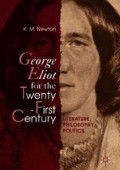Abstract
Critical controversy has been a feature of Eliot’s literary legacy. This chapter considers different critical responses to her work by three of her major critics. Barbara Hardy defended the form of her novels in the face of objections, notably by Henry James. She had relatively little interest in Eliot as intellectual, even questioning whether Eliot’s agnosticism is clear-cut. Felicia Bonaparte in contrast sees Eliot as a writer whose mind was shaped by science and rationalism but believes there is conflict with her moral agenda. J. Hillis Miller reads Eliot as a proto-deconstructionist and concentrates particularly on the role of metaphors in her literary discourse. Though all have made valuable contributions to Eliot criticism, the chapter addresses certain problems with all of their positions.
Access this chapter
Tax calculation will be finalised at checkout
Purchases are for personal use only
Notes
- 1.
- 2.
Barbara Hardy, A Critic’s Biography (2006), 124, 124–5.
- 3.
For a discussion of Eliot’s relationship with Myers which includes letters between them, see Beer (1998).
- 4.
See also Oldfield’s biography of Senior , Jeanie, an ‘Army of One’ (Brighton: Sussex Academic Press, 2008).
- 5.
See Bernard J. Paris, ‘George Eliot’s Unpublished Poetry’, Studies in Philology, 56 (1959), 541–2.
- 6.
Felicia Bonaparte, Will and Destiny: Morality and Tragedy in George Eliot’s Novels (1995), xxii. All subsequent references are incorporated in the text.
- 7.
See preface to Deconstruction and Criticism, Harold Bloom et al., viii.
- 8.
J. Hillis Miller , Reading for Our Time: ‘Adam Bede’ and ‘Middlemarch’ Revisited, xii. All subsequent quotations included within the text.
- 9.
See J. Hillis Miller , The Form of Victorian Fiction, 83, 84–5, and chapter on ‘The Narrator as General Consciousness’.
- 10.
Myers made strenuous but unsuccessful efforts to get Eliot to consider spiritualism. See John Beer, Providence and Love.
- 11.
Cited in Peter Garratt, 183.
- 12.
- 13.
See Jacques Derrida (1987).
- 14.
For further discussion and reflection on issues related to narration, see K. M. Newton (2011).
- 15.
It is not clear whether Miller is aware that Eliot had a strong interest in cynicism. See Helen Small (2012).
Bibliography
John Beer, Providence and Love: Studies in Wordsworth, Channing, Myers, George Eliot, and Ruskin (Oxford: Clarendon Press, 1998).
Harold Bloom et al., Deconstruction and Criticism (London: Routledge and Kegan Paul, 1980).
Felicia Bonaparte, The Tryptych and the Cross: The Central Myths of George Eliot’s Poetic Imagination (Brighton: Harvester Press, 1979).
———, Will and Destiny: Morality and Tragedy in George Eliot’s Novels (New York: New York University Press, 1995).
Wayne C. Booth, The Rhetoric of Fiction (2nd ed.) (Chicago: University of Chicago Press, 1983).
Seymour Chatman, Coming to Terms: The Rhetoric of Narrative in Fiction and Film (Ithaca and London: Cornell University Press, 1990).
Jacques Derrida, The Truth in Painting, trans. Geoffrey Bennington and Ian McLeod (Chicago: University of Chicago Press, 1987).
Avrom Fleishman, George Eliot’s Intellectual Life (Cambridge: Cambridge University Press, 2010).
Peter Garratt, Victorian Empiricism: Self, Knowledge, and Reality in Ruskin, Bain, Lewes, Spencer, and George Eliot (Madison: Farleigh Dickinson University Press, 2010).
Gordon S. Haight, ed., A Century of George Eliot Criticism (London: Methuen, 1965).
———, George Eliot: A Biography (Harmondsworth: Penguin, 1985).
Barbara Hardy, The Novels of George Eliot: A Study in Form (London: The Athlone Press, 1959).
———, A Critic’s Biography (London: Continuum, 2006).
W. J. Harvey, The Art of George Eliot (London: Chatto and Windus, 1961).
J. Hillis Miller, The Form of Victorian Fiction (Notre Dame: University of Notre Dame Press, 1968).
———, Reading for Our Time: ‘Adam Bede’ and ‘Middlemarch’ Revisited (Edinburgh: Edinburgh University Press, 2012).
K. M. Newton, ‘Narration in Middlemarch Revisited’, George Eliot Review, 42 (2011), 19–25.
Sybil Oldfield, ‘Who Was Mrs Nassau Senior? Was She the Inspiration for George Eliot’s Dorothea in Middlemarch?’, George Eliot Review, 40 (2009), 7–17.
Nicholas Royle, Telepathy and Literature: Essays on the Reading Mind (Oxford: Blackwell, 1990).
Helen Small, ‘George Eliot and the Cosmopolitan Cynic’, Victorian Studies, 55 (2012), 85–105.
Author information
Authors and Affiliations
Rights and permissions
Copyright information
© 2018 The Author(s)
About this chapter
Cite this chapter
Newton, K.M. (2018). Critical Encounters: Hardy, Bonaparte, Miller. In: George Eliot for the Twenty-First Century. Palgrave Macmillan, Cham. https://doi.org/10.1007/978-3-319-91926-3_3
Download citation
DOI: https://doi.org/10.1007/978-3-319-91926-3_3
Published:
Publisher Name: Palgrave Macmillan, Cham
Print ISBN: 978-3-319-91925-6
Online ISBN: 978-3-319-91926-3
eBook Packages: Literature, Cultural and Media StudiesLiterature, Cultural and Media Studies (R0)

